
9 Short Story Collections You Need to Read This Summer
Part Two of Lit Hub’s Summer Preview
After the last few years, it’s safe to say all our attention spans have gotten a little short-circuited. But hey, there’s no season like the summer for distraction. (Ball! Pool! Squirrel! etc.) If you find yourself needing to dip in and out of your books when the weather’s fine, one of these great new short story collections may be just the thing. Here are the ones the Lit Hub staff most highly recommends.
*
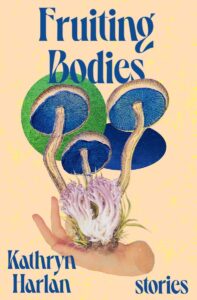
Kathryn Harlan, Fruiting Bodies
W.W. Norton and Company, June 7
Kathryn Harlan’s debut short story collection is right up my alley: tales of women and girls with a touch of the supernatural and strange, engaging with our (very strange, sometimes supernatural) world. In the opening story, two tweens on summer vacation sneak out of the house to go swimming in an eerie, forbidden, algae-filled lake, and wake in the morning to disturbing news.
But before their excursion, Harlan managed to make me feel, like the narrator, on the edge of thirteen: “If I were to diagnose something special about that summer, other than the omnipresence of death, I would say it was the last year before language reached all the parts of me, before words started knocking softly on my head, trying to get in.” I’ll be eating this one up slowly, bite by bite. –Eliza Smith, special projects editor

Lisa Taddeo, Ghost Lover
Avid Reader Press, June 14
True to its name, Lisa Taddeo’s blistering last novel, Animal, tore through me quickly, coarsely, and mercilessly. Ghost Lover, her new short story collection, is a bit more subtle and gloomy and so it makes sense that it has affected me differently: floating around in the back of my mind, occasionally slamming doors or knocking things over. The nine stories in this collection, two of which have won Pushcarts, are dark and spooky explorations of anonymity, connection, shame, and passion. Reading it is an out-of-body experience. –Olivia Rutigliano, CrimeReads associate editor

Sayaka Murata, tr. Ginny Tapley Takemori, Life Ceremony
Grove, July 5
Sayaka Murata’s first short story collection translated into English (by Ginny Tapley Takemori), Life Ceremony is just as weird as her novels. With characters that inhabit the same uncanny valley as Keiko, the “Smile Mart” employee from Convenience Store Woman who has found her life’s purpose in the orderly comings and goings of the store, or Earthlings’ preteen Natsuki, who understands her stuffed hedgehog is from another planet and deadpans through incredible violence, the characters here are loners, up against conventions and expectations that cast them as outside traditional. Murata makes us question our understanding of what makes us human (or, in the case of “Lovers on the Breeze,” a window curtain). –Emily Firetog, deputy editor
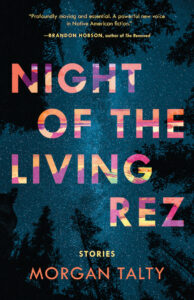
Morgan Talty, Night of the Living Rez
Tin House, July 5
Morgan Talty’s debut collection of linked stories, all narrated by a character named David, highlights the contemporary tales of Talty’s tribe, the Penobscot. These characters and their world shimmer with the precise details Talty so expertly showcases—the specific childhood cruelty, the expression of scarred grief. This is a stunning debut, both dark and tender, and reminder of the necessity and rewards of a diverse range of Native voices in the publishing industry. –Jessie Gaynor, senior editor
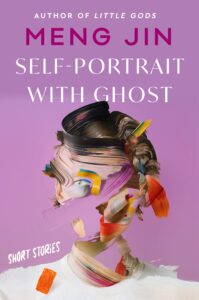
Meng Jin, Self-Portrait with Ghost
Mariner, July 5
In her debut novel, Little Gods, Meng Jin took us from China to America and back, and our protagonist was preoccupied with cobbling together an understanding of her family. In her forthcoming collection, Self-Portrait with Ghost, that close observation is turned inwards (as the title might suggest). The narrators in these pages are painfully honest. Look: “With previous lovers, I’d eaten up stories of other women hungrily, hurting myself with jealousy until it felt like love.” Ouch. Hurt me here!
Layered in these tales is the way the past continues to haunt—both in ways we accept (exes) and in ways that verge on the surreal (ghosts). The eponymous story takes place outside the public library, where the narrator’s dead aunt is waiting for her so she can criticize her writing. Yes, it’s safe to say these stories pack just as much of an emotional wallop as her first book. –Katie Yee, associate editor

Rebecca Miller, Total
FSG, July 12
The first collection of short fiction from acclaimed indie film director Rebecca Miller (The Ballad of Jack and Rose, The Private Lives of Pippa Lee) in over 20 years, the seven brilliantly knotty and piercingly intimate stories in Total depict characters undone, temporarily or irreparably, by obsessive love. In “Mrs. Covet,” an overwhelmed mother of three becomes unnerved by the uber-competent housekeeper’s bond with her infant son. In “Vapors,” the appearance of an emotionally abusive former lover sends a woman on a reverie through her past relationships. For me, the collection’s standout is the title story, which begins with a sci-fi premise (advanced pleasure cell phones that cause heartbreaking birth defects) and becomes a sweetly tragic tale of misguided familial love and lost innocence. –Dan Sheehan, Book Marks editor in chief
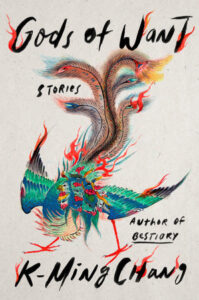
K-Ming Chang, Gods of Want
One World, July 12
When I read K-Ming Chang’s debut novel, Bestiary, I was floored. She has this memorable way of marrying myth with a story about migration, mothers and daughters, queerness, and long-buried family secrets. Her new story collection, Gods of Want, lives in a similar realm and reaffirms her place as one of our most enchanting storytellers today. In these pages, you’ll find ghost cousins, a lot of aunts, haunting mother-in-laws—essentially, women who are trying to make it work. From every first sentence, she has you hooked. In “Auntland,” the first story, we begin: “I had an aunt who went to the dentist and asked to have her tongue pulled.” Her tongue!
So much of the joy of reading K-Ming Chang’s stories is in her ability to constantly surprise. In “Xífù,” she starts with: “I don’t mean I want her to die. I’m just saying, what kind of woman pretends to kill herself six times?” Every sentence bites down. There’s a wry matter-of-factness that makes you buy into all the surreal elements. There’s a dark humor that makes you lean in closer. –Katie Yee, associate editor
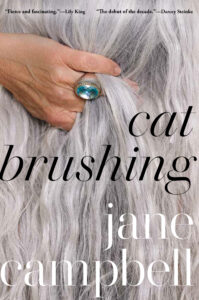
Jane Campbell, Cat Brushing
Grove, August 9
Eighty-year-old Jane Campbell’s elegant and necessary debut collection centers the experiences of older women who have long been deemed invisible in society. These 13 stories give us 13 different voices, the likes of which we’ve never heard: they are all women, past middle age, with a keen sense of their own mortality, but still with a hunger for experience and understanding. A dying woman experiences lust for the first time for the young nurse taking care of her in an elderly facility. A woman brushes her cat and remembers the pleasures of youth and sex, mourns what has past. Mysterious cuts and scratches found on a woman’s body foretell the end, though she doesn’t remember how she got them. A woman who believes her life is over meets a man on a train and finds love, but finds cruelty too. With serenity and the weight of years lived, Campbell sketches a quietly transgressive collection of characters both familiar and entirely new, sharp with grief and wit, and resolutely ready to tell their stories. –Julia Hass, contributing editor

Italo Svevo, A Very Old Man: Stories
New York Review of Books, August 9
Italo Svevo achieved international acclaim as the author of Zeno’s Conscience, a modernist novel following the story of Zeno Cosini as he narrates his thoughts about family life, romantic misadventures, and the neuroses that make up his daily life. Now, NYRB Classics is issuing a set of five stories that Svevo wrote later in life; originally intended to be parts of a novel, they are available here to read in translation by Frederika Randall, with an introduction by Nathaniel Rich. It’s always fascinating to see a great writer’s work in progress; this is no exception, and is a great reason to revisit Svevo’s work in general. –Corinne Segal, senior editor
Emily Temple
Emily Temple is the managing editor at Lit Hub. Her first novel, The Lightness, was published by William Morrow/HarperCollins in June 2020. You can buy it here.












